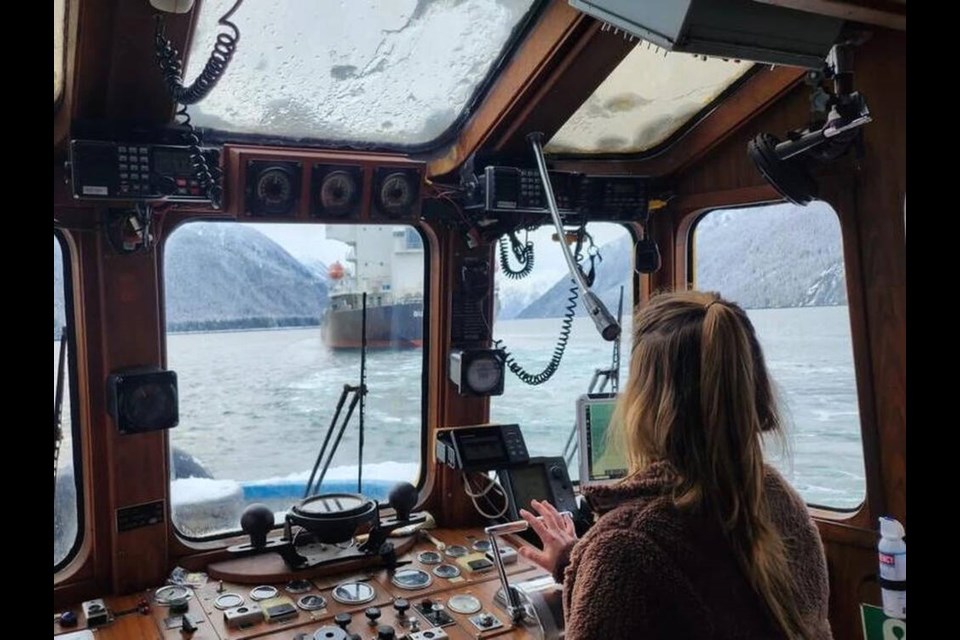Glenda Luymes/Vancouver Sun
Two women who have known each other since elementary school made up what is believed to be saąúĽĘ´«Ă˝’s first all-women tugboat crew on a trip from Prince Rupert to Stewart a few days before Christmas.
Capt. Hailey McIntyre said she expected the trip to feel normal — that is, moments of “sheer boredom and great excitement” — but was surprised by her own emotions.
“I just felt very happy, very proud,” she said Friday.
The three-day trip began Dec. 19 when McIntyre, 30, and deckhand Ocean Rutherford, 32, left Prince Rupert aboard SAAM Towage’s Apache.
They arrived in Stewart, near the Alaska border, 12 hours later. After a night at a hotel, the container ship arrived and the tugboats assisted with docking.
McIntyre described the work as “meticulous and busy,” complicated by ocean surges and weather.
After loading, the tug followed the ship out and arrived back in Prince Rupert around midnight.
McIntyre and Rutherford are believed to be the first all-women tugboat crew in saąúĽĘ´«Ă˝, as well as the first in SAAM’s 70-year history.
But the journey to Stewart was just a small part of a longer journey for McIntyre, who knew from a young age that she wanted to work on the water.
“It’s in my blood,” she said. “I grew up hearing the stories of my family.”
Born and raised in Prince Rupert, with family members on both sides who worked in commercial fishing including her great-grandmother, she joined the sea cadets program as a teen, worked as a sailing instructor and volunteered for search and rescue.
Doors began to open in 2012, when a summer job for the Prince Rupert Port Authority led to six years of work, during which time she tried to join a small tugboat company.
“I’m not sure the official reason, but I was told we’re not comfortable sending you out of town on this equipment with these men,” she recalled.
In 2017, she joined a spill response company, and while the work led to experience on bigger vessels, it was sporadic. She tried whale watching, but it didn’t suit her.
Then she got word that SAAM was hiring.
She had an engineers ticket and joined as a deckhand engineer. “I began climbing the ladder.”
McIntyre now has a Master 150GT ticket, referring to the size of boats she can operate. She is hoping to start on her Master 500GT ticket in the new year, which would allow her to do routes with bigger boats further offshore.
SAAM Towage saąúĽĘ´«Ă˝ director of operations Brook Walker recalls hiring McIntyre in December 2018.
“She didn’t join in the gentle time of year,” he said, referring to the frigid conditions on the water in January.
But she quickly earned the trust of senior captains.
Walker said that boils down to whether at 2 a.m. in the morning, facing thick fog on the water, someone is going to make the next right decision.
“If we trust that she will — and we do — we’ll support her to the largest qualification she wants to achieve,” he said.
Becoming a tugboat captain requires both experience — accumulating sea time on different vessels — as well as education. Training is an investment for the company, but it’s also necessary. Facing a skill shortage, SAAM is looking for people with both the “capability and interest.”
“We’ll not only support her to keep going, we absolutely need her to,” said Walker.
McIntyre credits her guild and union, the International Longshore and Warehouse Union, Local 400, with helping her kick open the doors to the industry.
President Jason Woods said it’s exciting to see the number of women on the water increase. In 2016, there were no women in McIntyre’s bargaining unit. Now the number sits at 15 per cent.
“The sea change is happening,” he said, “but it’s slow.”
Retention is an issue on the union’s agenda for the new year.
McIntyre said she hopes to inspire other women to join her and dispel the old idea that “boats are for boys.”
But she doesn’t want to be doing a job that entails “a series of controlled collisions” at age 75.
“Let me pass on what I know and let’s get the next generation going.”


